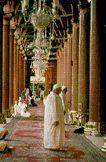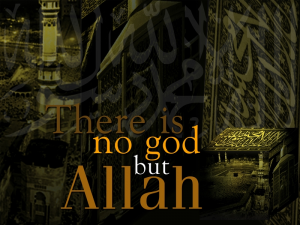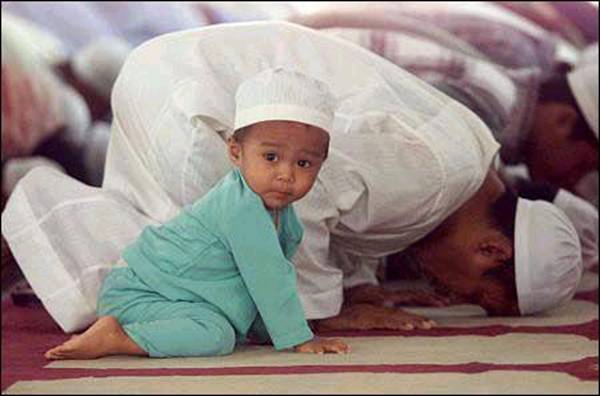Irish person converted to islam
Posted by in Islamic video
Comments Off on Irish person converted to islam
|
The islamic history : the hijrah 2-18
Posted by in Islamic history
Comments Off on The islamic history : the hijrah 2-18
|
After Muhammad had preached publicly for more than a decade, the opposition to him reached such a high pitch that, fearful for their safety, he sent some of his adherents to Ethiopia, where the Christian ruler extended protection to them, the memory of which has been cherished by Muslims ever since. But in Mecca the persecution worsened. Muhammad’s followers were harassed, abused, and even tortured. At last, therefore, Muhammad sent seventy of his followers off to the northern town of Yathrib, which was later to be renamed Medina (“The City”). Later, in the early fall of 622, he learned of a plot to murder him and, with his closest friend, Abu Bakr al-Siddiq, set off to join the emigrants.
In Mecca the plotters arrived at Muhammad’s home to find that his cousin, ‘Ali, had taken his place in bed. Enraged, the Meccans set a price on Muhammad’s head and set off in pursuit. Muhammad and Abu Bakr, however, had taken refuge in a cave where, as they hid from their pursuers, a spider spun its web across the cave’s mouth. When they saw that the web was unbroken, the Meccans passed by and Muhammad and Abu Bakr went on to Medina, where they were joyously welcomed by a throng of Medinans as well as the Meccans who had gone ahead to prepare the way.
This was the Hijrah – anglicized as Hegira – usually, but inaccurately, translated as “Flight” – from which the Muslim era is dated. In fact, the Hijrah was not a flight but a carefully planned migration which marks not only a break in history – the beginning of the Islamic era- but also, for Muhammad and the Muslims, a new way of life. Henceforth, the organizational principle of the community was not to be mere blood kinship, but the greater brotherhood of all Muslims. The men who accompanied Muhammad on the Hijrah were called the Muhajirun – “those that made the Hijrah” or the “Emigrants” – while those in Medina who became Muslims were called the Ansar or “Helpers.”
Muhammad was well acquainted with the situation in Medina. Earlier, before the Hijrah, the city had sent envoys to Mecca asking Muhammad to mediate a dispute between two powerful tribes. What the envoys saw and heard had impressed them and they had invited Muhammad to settle in Medina. After the Hijrah, Muhammad’s exceptional qualities so impressed the Medinans that the rival tribes and their allies temporarily closed ranks as, on March 15, 624, Muhammad and his supporters moved against the pagans of Mecca.
The first battle, which took place near Badr, now a small town southwest of Medina, had several important effects. In the first place, the Muslim forces, outnumbered three to one, routed the Meccans. Secondly, the discipline displayed by the Muslims brought home to the Meccans, perhaps for the first time, the abilities of the man they had driven from their city. Thirdly, one of the allied tribes which had pledged support to the Muslims in the Battle of Badr, but had then proved lukewarm when the fighting started, was expelled from Medina one month after the battle. Those who claimed to be allies of the Muslims, but tacitly opposed them, were thus served warning: membership in the community imposed the obligation of total support. (more…)
Converted to Islam after a funeral !!
Posted by in Islamic video
Comments Off on Converted to Islam after a funeral !!
|
The islamic history : the message 1-18
Posted by in Islamic history
Comments Off on The islamic history : the message 1-18
|
In or about the year 570 the child who would be named Muhammad and who would become the Prophet of one of the world’s great religions, Islam, was born into a family belonging to a clan of Quraysh, the ruling tribe of Mecca, a city in the Hijaz region of northwestern Arabia.
Originally the site of the Ka’bah, a shrine of ancient origins
, Mecca had with the decline of southern Arabia (see Chapter l ) become an important center of sixth-century trade with such powers as the Sassanians, Byzantines, and Ethiopians. As a result the city was dominated by powerful merchant families among whom the men of Quraysh were preeminent.
Muhammad’s father, ‘Abd Allah ibn’Abd al-Muttalib, died before the boy was born; his mother, Aminah, died when he was six. The orphan was consigned to the care of his grandfather, the head of the clan of Hashim. After the death of his grandfather, Muhammad was raised by his uncle, Abu Talib. As was customary, Muhammad as a child was sent to live for a year or two with a Bedouin family.
This custom, followed until recently by noble families of Mecca, Medina, Tayif, and other towns of the Hijaz, had important implications for Muhammad. In addition to enduring the hardships of desert life, he acquired a taste for the rich language so loved by the Arabs, whose speech was their proudest art, and learned the patience and forbearance of the herdsmen, whose life of solitude he first shared and then came to understand and appreciate. (more…)
What do you know about “logic of creator” in your life ?
Posted by in Islamic video
Comments Off on What do you know about “logic of creator” in your life ?
|
listen to this comfortable voice from ahmed al agami
Posted by in Islamic video
Comments Off on listen to this comfortable voice from ahmed al agami
|
The Fasting of Ramadan: A Time for Thought, Action, and Change! 2-2
Posted by in Current Issues
Comments Off on The Fasting of Ramadan: A Time for Thought, Action, and Change! 2-2
|
6. Fasting elevates the human spirit and increases our awareness of God. It strengthens our will-power as we learn to rise above our lower desires. The institution of fasting is both unique and a shared experience in human history. From the very beginning of time, humans have struggled to master their physical and psychological selves: their bodies and their emotions. Hunger is one the most powerful urges that we experience. Many, through over- or under-eating or consumption of unhealthy foods, abuse this urge. Thus, when a person purposefully denies something to their own self that it craves, they are elevating their mind above their body, and their reason and will above their carnal passions. “A fasting person empties his stomach of all the material things: to fill his soul with peace and blessings, to fill his heart with love and sympathy, to fill his spirit with piety and Faith, to fill his mind with wisdom and resolution,” says H. Abdalati in Islam in Focus. The person who can rule their desires and make them work, as they like, has attained true moral excellence.
7. With the clarity of mind and absence of distractions, also comes a greater focus. As students, the period of fasting, especially early during the day, serves as a tool to focus our minds on our academics. In the month of Ramadan, many Muslims try to avoid watching TV, listening to music, and some other leisure activities, which spares them more time and energy to be spent on more productive activities such as academics, intense study of Islam, voluntary prayers, social and humanitarian causes, and a quality time with the family, to name a few. It is a reminder of our duty to God, our purpose and higher values in life, as God Himself describes the purpose of fasting as follows, “O you who Believe! Fasting has been prescribed for you as it was prescribed for those before you, so that you may develop consciousness of God” (Quran 2:183). (more…)
The Fasting of Ramadan: A Time for Thought, Action, and Change! 1-2
Posted by in Current Issues
Comments Off on The Fasting of Ramadan: A Time for Thought, Action, and Change! 1-2
|
“Fasting in Ramadan develops in a person the real spirit of social belonging, of unity and brotherhood, and of equality before God. This spirit is the natural product of the fact that when people fast they feel that they are joining the whole Muslim society (which makes up more than one fifth of world’s population) in observing the same duty, in the same manner, at the same time, for the same motives, and for the same end. No sociologist or historian can say that there has been at any period of history anything comparable to this powerful institution of Islam
: Fasting in the month of Ramadan. People have been crying throughout the ages for acceptable ‘belonging’, for unity, for brotherhood, for equality, but how echoless their voices have been, and how very little success they have met…” says Hammudah Abdalati, in Islam in Focus.
“What is fasting?” “How does the fasting of Muslims in Ramadan differ from the fasting of other faiths?” “Why should one ‘torture’ one’s body in the first place?” “What do you really gain from fasting in the end?”…These are a few questions that a number of non-Muslim friends and colleagues often ask us, usually out of fascination with this spiritually-uplifting practice of Islamic faith, and at times out of pity and sympathy for us, thinking, why should anyone suffer from hunger and thirst like Muslims? I wouldn’t be surprised if many of us shared the same negative perception of Fasting. (more…)
Have you ever listened to qura’n from “haram” maka with this nice voice ?
Posted by in Islamic video
Comments Off on Have you ever listened to qura’n from “haram” maka with this nice voice ?
|
Taraweeh Prayers in Ramadan Special prayers are said each evening of the holy month
Posted by in Current Issues
Comments Off on Taraweeh Prayers in Ramadan Special prayers are said each evening of the holy month
|
When the month of Ramadan begins, Muslims enter into a period of discipline and worship: fasting during the day, and praying throughout the day and night. During Ramadan, special evening prayers are conducted during which long portions of the Qur’an are recited. These special prayers are known as taraweeh.
The word taraweeh comes from an Arabic word which means to rest and relax. The prayer can be very long (well over an hour), during which one stands upright to read from the Qur’an and performs many cycles of movement (standing, bowing, prostrating, sitting). After each four cycles, one sits for a brief period of rest before continuing — this is where the name taraweeh (“rest prayer”) comes from.
During the standing portions of the prayer, long sections of the Qur’an are read. The Qur’an is divided into equal parts (called juz) for the purpose of reading sections of equal length during each of the Ramadan nights. Thus, 1/30 of the Qur’an is read on successive evenings, so that by the end of the month the entire Qur’an has been completed.
It is recommended that Muslims attend the taraweeh prayers in the mosque (after ‘isha, the last evening prayer), to pray in congregation. This is true for both men and women. However, one may also perform the prayers individually at home. These prayers are voluntary, but are strongly recommended and widely practiced.
There has been some dispute about how long the taraweeh prayer is supposed to be: 8 or 20 raka’at (cycles of prayer). It is without dispute, however, that when praying the taraweeh prayer in congregation, one should start and end with the imam, according to the number that he performs. Night prayers in Ramadan are a blessing, and one should not argue about this fine point. For more details about the evidence in support of each opinion, please see the articles linked below.
Saudi Arabia television broadcasts the taraweeh prayers live from Mecca, Saudi Arabia, now with simultaneous subtitling of the English translation. See the links below to watch.
source : http://islam.about.com











